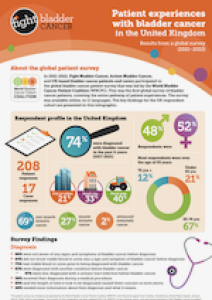A Deep Dive into Bladder Cancer Pathway Improvements
By Pamela McGowan
In a pivotal step toward creating a sustainable and enhanced care framework for bladder cancer patients, Fight Bladder Cancer's Exemplar Meeting 'Improving the Bladder Cancer Pathway' took place in Birmingham on 7th September 2023. The event brought the bladder cancer community together, facilitating an exchange of knowledge and information among key stakeholders, experts, advocates and patients alike, with the aim of developing concrete actions and recommendations for improving patient experience across the devolved nations.

The primary focus of the meeting was to build on findings and recommendations from the Exemplar Report (1), which took the form of discussing best practice and gaps in care, exploring critical issues and understanding the challenges faced, before proposing and prioritising actionable strategies for pathway improvement.
Spotlight on Bladder Cancer Misdiagnosis
Maintaining a patient focussed approach, data from a recent UK survey, co-commissioned by a group of bladder cancer patient organisations (including Fight Bladder Cancer and the World Bladder Cancer Patient Coalition) was unveiled at the Exemplar Review Meeting, revealing some concerning statistics…
Among the survey results, it was discovered that a staggering 63% of bladder cancer patients were initially misdiagnosed, with UTI's cited as the most common incorrect diagnosis and a propensity toward misdiagnoses among women, highlighting gender disparities. Notably, a substantial percentage of respondents visited their GP multiple times before receiving a referral to a specialist (2).
Why This Matters:
It is well established that delayed diagnosis leads to poorer outcomes, yet, whilst bladder cancer is a common form of cancer, it is often overlooked, and symptoms are not well understood. Patients continue to have their symptoms, such as frequent urination or pain, brushed aside, mistaken for less severe conditions, despite prompt diagnosis having considerable impact on prognosis and survival rates…
Data from the Office for National Statistics (ONS) underscores the crucial importance of early diagnosis for bladder cancer. The one-year survival rates for patients diagnosed at stage 1 are significantly higher: 95.9% for men and 93.1% for women. In contrast, survival rates drop to 77.8% for men and 64.5% for women when considering all stages of bladder cancer combined. This data is age-standardised and specific to patients diagnosed in England between 2013-2017, followed up to 2018. Note that these statistics do not encompass bladder cancer cases that may be coded under other ICD-10 codes outside of C67 (3,4).
An additional consideration, particularly for stakeholders, is that bladder cancer carries the highest cost of any cancer globally on a per-patient basis (5). Therefore, putting in place an exemplar pathway to improve bladder cancer services (including raising awareness, delivering faster referral and diagnosis for those with suspected bladder cancer, and encouraging implementation of a standardised pathway across the United Kingdom) would not only seek to improve patient outcomes but have a potentially significant impact on the cost of provision too.
Key Insights from The Exemplar Review Meeting include:
Dr Olena Mandrik, Research Fellow at ScHARR, University of Sheffield: An expert in healthcare decision science, Dr Mandrik focuses on evaluating public health programmes, especially cancer screening. She discussed significant findings from 2013-2019, emphasising the need for a national bladder cancer audit.
John McGrath, Consultant Urologist at the Royal Devon University Hospital: Heading the GIRFT programme in NHS England, John's efforts are directed towards minimising clinical care variations and promoting best practices. He shed light on the potential of Urological Investigation Units (UIU) as effective practice models, drawing support from Hospital Episode Statistics.
Hilary Baker, Macmillan Lead Nurse Specialist in Uro-oncology at UCLH: Tasked with bolstering cancer nursing and pathways within the North Central London Cancer Alliance, Hilary underscored the alarming potential exodus from the nursing profession, with an estimated 70% contemplating leaving in the coming five years. She highlighted a pilot programme focused on cancer CNS development in London.
Alex Filicevas and Melanie Costin: Alex, the inaugural Executive Director of WBCPC since 2019, champions global bladder cancer patient advocacy. Melanie, a bladder cancer patient and the Support Services Manager at Fight Bladder Cancer, brings personal experience and dedication, making her an integral part of the community. Together, they presented the Global bladder cancer patient survey findings, pinpointing prevalent misdiagnoses and the evident need for emotional support.

Breakout sessions were a reservoir of knowledge and insight, focusing on three key pillars:
1. Exemplar Pathway: From primary care training to the potential of UIUs and patient self-referral.
2. Bladder Cancer Workforce: Strategies included clearer career pathways, offering online education modules, and student nurse rotations.
3. Improving Awareness and Patient Support: A multi-faceted approach ranging from updated NICE guidance, mental wellbeing markers, to introducing media presence.
The Exemplar Review Meeting provided a starting point for meaningful action, with the insights and findings gathered serving as a blueprint for policy change and stakeholder engagement moving forward.
Fight Bladder Cancer intends to ensure the immense potential of this event is realised by producing a comprehensive Bladder Cancer Policy Report, preserving, and articulating the knowledge shared (including current best practice, gaps in the pathway, along with proposals to bridge these gaps), whilst ultimately translating outcomes into actionable policy recommendations for improving bladder cancer care throughout the UK.
With continued conversation, along with the support of all key stakeholders, there is hope for action and a brighter future for bladder cancer patients and their loved ones. You too, can join the conversation by sharing your personal experience on social platforms and tag us @BladderCancerUK
Join the conversation on Fight Bladder Cancer's social media platforms…
https://www.facebook.com/BladderCancerUK
https://www.linkedin.com/company/fight-bladder-cancer
https://twitter.com/BladderCancerUK
https://www.instagram.com/bladdercanceruk/
References:
(2) https://fightbladdercancer.co.uk/downloads/patient-experience-survey
(5) The global burden of urinary bladder cancer (2020) 38:1895–1904. https://doi.org/10.1007/s00345-019-02984-4
-
 Patient Experience Survey
Patient Experience Survey
-
 Exemplar Roundtable Report
Exemplar Roundtable Report
-
 Exemplar policy & research report
Exemplar policy & research report
-
 Policy priorities for action
Policy priorities for action